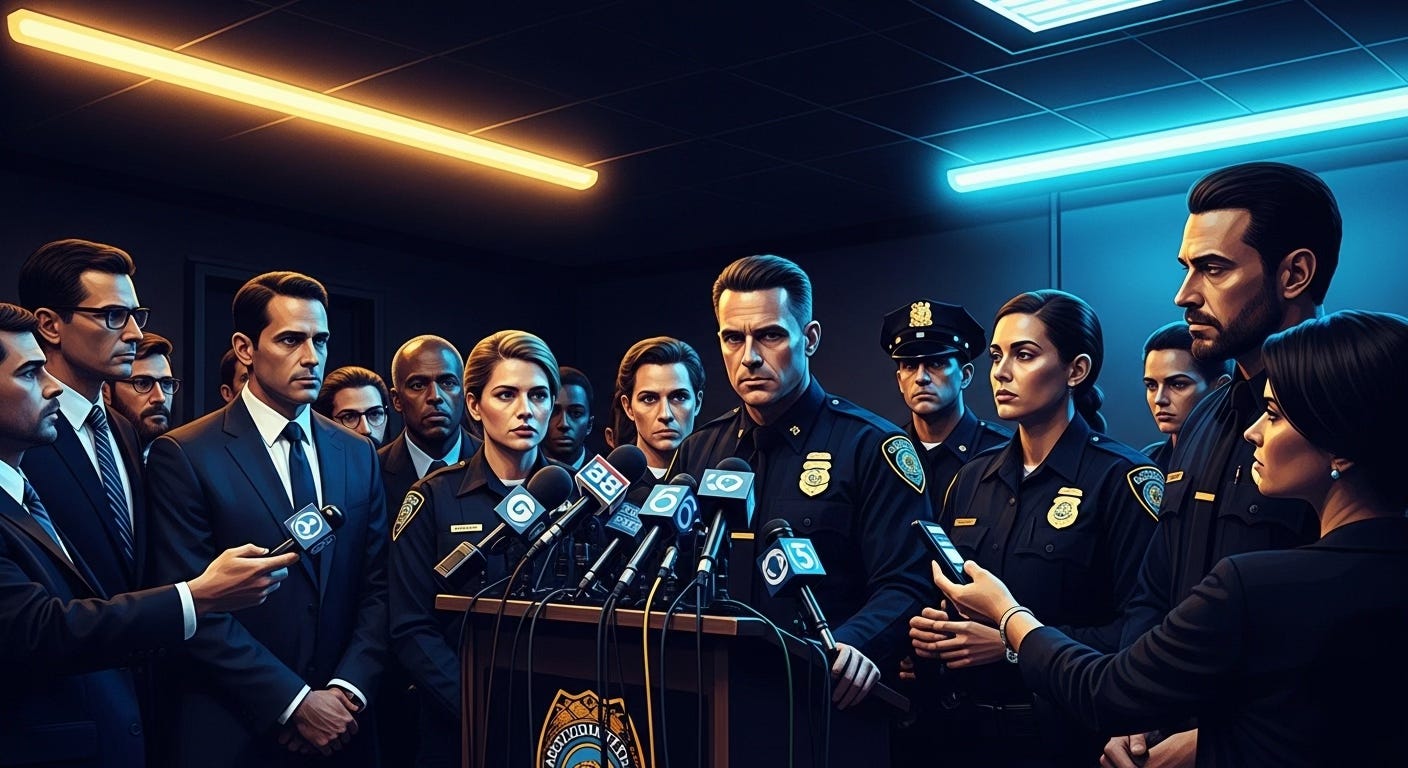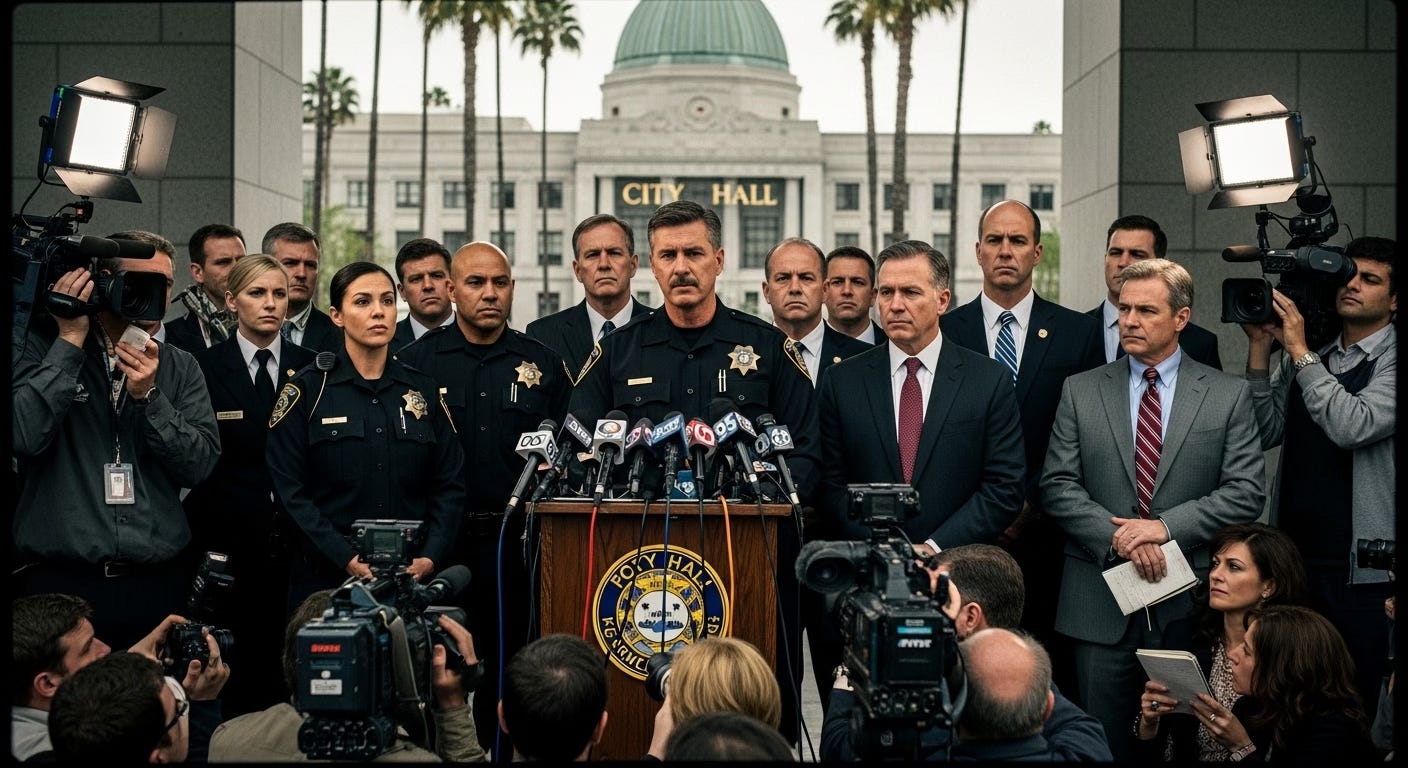The Big Lie of Modern Policing: “We Can’t Arrest Our Way Out”
When chiefs echo activist talking points and pour billions into failed CVI schemes, communities pay the price—and crime thrives
How long would a plumber stay in business if he said pipe leaks are natural and “meant to weep water”? Or an exterminator who insisted you should just “learn to live” with infestations? Or a surgeon who told patients, “We can probably remove the cancer, but it doesn’t matter—you’ll die anyway”?
Ridiculous, right?
Yet every time a microphone is plugged in and the cameras roll, another police leader or politician repeats the same absurd line: “We can’t arrest our way out of that problem.” Police leaders, politicians, and even patrol officers have been caught saying this, as though it absolves them of duty. Worse, this phrase has filtered down to the patrol level, where officers now repeat it to crime victims—people who called the police for help.
(This article is an updated version of a piece originally published in May 2023. It is amazing to see how in two years some areas where conditions have improved yet other areas have worsened. All my archived articles are available to free subscribers for a limited time. With your paid subscription, you directly fuel this mission. This support allows me to continue creating high-quality content and enables me to bring this work to more people than ever before.)
Abdication Disguised as Strategy
Homelessness, substance abuse, youth gun violence, mental illness—these are the topics where chiefs and sheriffs have been coached to step aside. In Florida, some sheriffs are already repeating it when asked about homelessness.
But here’s the truth: law enforcement first responders are still the most qualified, experienced, and equipped professionals to safely engage citizens in crisis. I’ve watched co-responder models rolled out in major media markets—celebrated as “successes”—but at unsustainable costs. Even in New York City, social workers never showed up to the operation police were told to share with them. You read that correctly. During a planned media event to showcase this evolved and enlightened model, what skeptics would call a dog and pony show, the social workers just didn’t show up. Ironically, the officer interviewed, Officer Leedroige Manuel, gave that famous line, ‘we can’t arrest our way out of these situations.’ He had better figure something out because the social service cavalry isn’t coming to save the day.
The more data I gather on both co-responder and Community Violence Intervention (CVI) programs, the clearer it becomes: law enforcement remains the only practical solution for mitigating acute crises in communities.
“No-Response” is Not a Strategy
In the early 1990s, some officers tried to talk citizens out of filing reports. Now the abdication has reached the top: chiefs and sheriffs themselves.
My agency had a robust civilian community service officer program - unarmed staff that would respond to calls that didn’t require a sworn response. In the computer aided dispatch system, I saw that the no-response list had tripled in size in five years. No one was ever removed from the list, and I warned at the time: “You’re about to no-response yourselves out of business.”
Today, weak leaders have gone further. They’re cutting away entire dimensions of police authority, refusing to use lawful force, and openly embracing activist propaganda like Campaign Zero. (Remember ‘eight can’t wait?’)
Some even claim that crime itself is the fault of police, or describe gun violence as a “public health crisis”—all while those very cities with the strictest firearm ordinances drown in shootings.
This is not leadership. It is surrender. And it hands the “defund the police” activists exactly the leverage they need.
The Scam Revealed
Billions of dollars are being funneled to CVI vendors, who point to supposed “successes” in places like Baltimore, Chicago, St. Louis, and Oakland. But anyone who looks honestly at these cities can see the reality: the measures don’t work.
In fact recently they have been recorded interfering with arrests. It is hard to find a CVI program that hasn’t been plagued with serious criminal issues, from using this position to be a more lucrative drug dealer to acting as double-agent, providing information to gangs about rival gangs and the police.
If this were a fair fight, there would be tests—side-by-side comparisons where CVI and social workers could prove their superiority over traditional law enforcement. Neighborhoods like San Francisco’s Tenderloin or Philadelphia’s Kensington would be the perfect testbeds. Yet the experiment never comes, because deep down, everyone knows the outcome.
The Big Lie
The mantra “you can’t arrest your way out” is the big lie of modern policing.
Yes, Virginia—you can arrest your way out of most problems. Most headlines we read today are law enforcement scenarios that, with the right strategy, lead to desistance, disruption, or arrest. International examples prove it too: Sweden reduced human trafficking by targeting buyers rather than prostitutes, resulting in thousands of rescues and restorations.
Countless criminal problems can be solved through enforcement, precision policing, and targeted strategy. Meanwhile, the defund movement has already shown its hand: wherever policing was pulled back, gun violence spiked.
Let’s have a conversation in the comments section about any law enforcement area of responsibility that can’t be addressed by pro-arrest enforcement.
Policing was never meant to be outsourced, diluted, or apologized for. Law enforcement remains the most direct and effective line of defense against crime and disorder.
Let’s reject the empty rhetoric and salute the courageous leaders who empower their officers, deputies, and agents.
Please keep all peace officers in your prayers.
Roland Clee served a major Florida police department as a Community Service Officer for more than 26 years. His career included uniformed patrol, training, media relations, intelligence, criminal investigations, and chief’s staff. He writes the American Peace Officer newsletter, speaks at public safety, recruiting and leadership conferences and helps local governments and public safety agencies through his business, CommandStaffConsulting.com.
For media interviews and podcast appearances, click here: http://bit.ly/40pT3NS
References:
Even if Los Angeles wanted to put traffic enforcement into the hands of civilians, the assumption is that under the state vehicle code, such duties could only be handled by licensed peace officers. But the report argues that there are "plausible legal arguments that the vehicle code does not limit the City's discretion in this area."
The city Traffic Department already employs civilian "traffic officers," who direct traffic and enforce parking restrictions, according to the report. While they are not technically peace officers, they have the authority to issue parking tickets and to "perform other related duties."
Among those responsibilities is arresting "individuals without a warrant for a limited but varying list of civil violations related to taxis and ride-shares and other violations related to streets and sidewalks such as causing obstructions or dumping of prohibited substances," according to the report.
“When it comes to, I guess, teen violence and other teen crimes, I think it’s one of those things — you can’t arrest your way out of it,” Jones said.
https://abcnews.go.com/US/teen-curfew-enforced-dc-area-county-response-troubling/story?id=89405541
Prince George's County Police Chief Malik Aziz called the number of juvenile arrests "shocking" and a "significant" jump from last year.
"The vast number of juveniles are out doing the right thing and living a meaningful and positive life in Prince George's County," he said during Monday's press briefing, calling those who are committing crimes "outliers."
"We can't arrest our way out of this," he added.
Carjacking is one area of particular concern, officials said. Eighty-four juveniles have been arrested for carjackings this year, half of whom were under the age of 15, she said. Among the 84 arrested, 34 had prior arrests for a violent crime or gun offense, she said.
Bauman accompanied deputies on what was going to be their first joint operation with city social workers in an attempt to speak with these individuals on the highways.
“We can't arrest our way out of these situations,” said Officer Leedroige Manuel. “We want to work and see what other options we can bring to the table, other things we can do, collaborate with other agencies and see how we can do to address these issues on the highway.”
However, things didn’t go as planned. Despite Mayor Eric Adams making it a point to fuse law enforcement with social workers in circumstances like these, the city’s Departments of Social Services and Worker Protection did not show up for the event due to internal scheduling problems, according to CBS New York. So, law enforcement took it upon themselves to complete the project on their own.
https://thecrimereport.org/2022/06/15/why-the-white-house-backs-community-violence-intervention/






So if we just do our job , things will get better? , what a revolutionary concept! Crazy that this environment has become so prevalent within this profession. Appreciate you driving the conversation Roland!
Great insight.